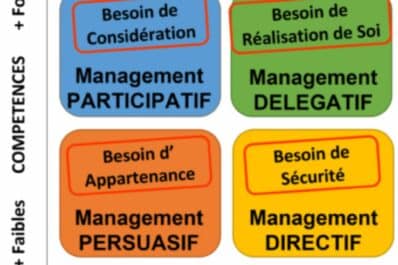Reactive Executive can provide you with an interim manager in less than 48 hours.
Find your manager
Communication: the key to success for a manager
In the role of management, one skill stands out: communication . Although it may seem obvious, underestimating its impact would be a serious mistake. Communication is much more than a skill, it is a pillar on which the success of an interim manager rests. But how can the ability to communicate influence the future of a company? What are the essential dimensions of communication to build trust within teams?
What is management communication?

Management communication is a process of exchange of information, ideas, needs and expectations between a manager and his teams. It encompasses all verbal, non-verbal and written interactions that occur within a business.
Communication in Management: the key elements and the impact on the company

For communication to be effective, several key elements must be considered:
- Clarity of the message : the manager must be clear and concise in his instructions, in order to be easily understood by his interlocutor.
- Empathy : the manager must be able to put himself in the shoes of his colleagues, to understand their needs and their motivations, in order to develop trust and respect.
- Active listening : to communicate effectively, it is important to listen to others. This means paying attention to what the employee says, how they say it and their non-verbal behavior.
- Appropriate nonverbal communication : Body language and tone of voice can strengthen or weaken the message. It is important to pay attention to your non-verbal communication so as not to create confusion.
Communication has a direct impact on decision-making in transition management . The more precise the information communicated, the more effective the decisions will be. Indeed, poor communication can lead to decisions being made based on incomplete or incorrect information, which can have harmful consequences for the business.
The manager must also be able to motivate, guide and coordinate his teams to achieve the set objectives. Effective communication promotes mutual understanding of objectives, strengthens team cohesion and allows conflicts to be resolved constructively.
The Challenges of Communication in Transition Management

Interim management presents specific challenges in terms of communication. Interim managers are often parachuted into a company, teams or corporate culture that they are not familiar with, which can make developing communication skills more difficult.
Analysis of communication challenges specific to interim managers
One of the main challenges for interim managers is the need to quickly gain the trust of their teams. As temporary outsiders, they must prove their worth and demonstrate their ability to lead. This requires transparent communication and a willingness to listen to employee concerns.
Often called upon for crisis management or major change, transition managers must ensure effective communication is established to maintain stability and reassure the teams.
For example, an interim manager responsible for reorganizing a struggling company must clearly communicate the reasons for the change, the next steps and the expected benefits for both the company and employees. Clumsy or evasive communication could lead to resistance to change.
The risks of inadequate communication
Inadequate communication carries several risks:
- Teams can become disengaged, resistant to change or even hostile,
- It can lead to errors, misunderstandings and conflicts, which harm productivity and team cohesion,
- It risks tarnishing the reputation of the interim manager.
Communication strategies for Transition Managers
To succeed in interim management, managers must develop effective communication strategies that take into account the specific challenges they face.
3 practical tips to improve communication in a transition situation
- Establish an initial diagnosis : before taking measures, you must understand the situation, the issues and the expectations. This allows you to determine the most appropriate communication.
- Develop a clear vision : interim managers must communicate their vision of the company’s future in a concise and convincing manner to mobilize teams.
- Promote transparency : Transparency builds trust. Interim managers must be open about their intentions, their decisions and the challenges the company faces.
The importance of active listening and feedback
Active listening is an essential skill in transition management. Managers must be available to listen to the concerns, ideas and suggestions of their teams. This shows that their opinions are valued, which strengthens collaboration.
Feedback is also essential for evaluating the effectiveness of communication. Interim managers will need to regularly solicit feedback from their employees to adjust their communication accordingly.
How to adapt communication according to the different actors involved?
Interim managers must also take into account the diversity of actors involved in the organization. Some may prefer more formal communication, while others enjoy a more informal approach. It is important to adapt your communication style according to individual preferences to maximize impact.
Communication is the key to success for an interim manager. It allows teams to come together, even in complicated situations, and to face challenges successfully. Interim managers who become good communicators are better prepared to succeed in constantly changing environments and contribute positively to the future of the organizations they lead. Reactive Executive guides you on the path to success by focusing on this key skill.



































